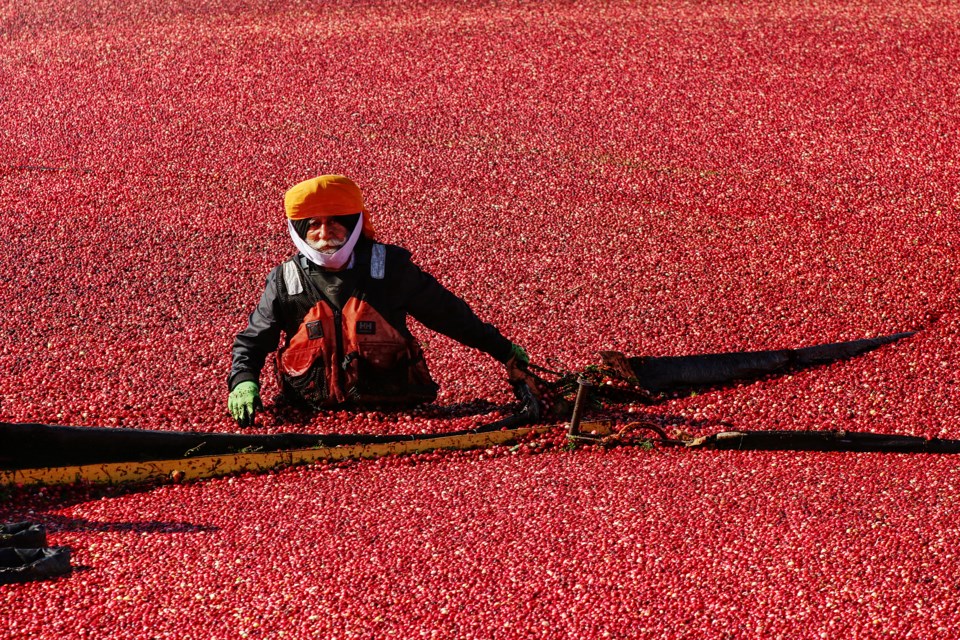The effects of climate change haven’t been generous to this year’s cranberry harvest.
A staple of Thanksgiving dinners, cranberry harvesting usually takes place during the fall in time for the second Monday of October, depending on how advanced the crop is.
However, this year’s harvest seems to be delayed, according to BC Cranberry Growers’ Association executive director Mike Wallis.
In 2023, B.C. had a fairly big crop of 1.3 million barrels, which represent about 45 kilograms of fruit each – this year’s crop is forecast to be average.
As growers across the Lower Mainland dig into their vines, white berries are still predominant, signifying a delay in the fruit’s ripening.
This hold-up can be attributed to the region's moderate climate over the last few months, including timely rains and no extreme temperature spikes or weather events like in previous years.
“Now is the time when it starts, when you get cooling temperatures overnight, that brings on the colour,” Wallis said. “We're seeing a little bit of delay in the ripening of the crop, and maybe that's because we've had such nice weather this fall.”
Seemingly, cranberry harvest delays are becoming increasingly common, as they were also late in 2022 due to similar reasons.
“The warm weather for cranberries is delaying the harvest as we are not getting colour due to warm nights,” Richberry Group president and Ocean Spray of Canada Ltd. chairman Peter Dhillon told BIV two years ago.
As extreme weather events intensify and become more frequent, a trend has been triggered where growers are looking for more high-yielding varieties of cranberries that are also more resilient to climate change.
The BC Cranberry Research Farm in Delta serves as a testing ground to evaluate the performance and viability of new varieties in the Cascadia region, such as cranberries brought in from the eastern U.S., said Wallis.
“Putting in an acre of cranberries is an expensive proposition, so the grower has to maximize what he's able to produce,” he explained. “And that, very often, is introducing a new, higher-yielding variety in order to make sure that returns are sustainable.”
Wallis says farmers face a lot of challenges, ranging from climate to water security, labour shortages, government policies and regulatory matters – important issues for party leaders to consider ahead of B.C.’s Oct. 19 election.
“Most of the candidates are supportive of agriculture, I think they do understand food security.” said Wallis. “And in order to have food security, you have to have policy and regulations that support food production.”
He referred to the 2021 floods that knocked-out transportation infrastructure across the province and disrupted supply chains, noting their reinforcement should be a focus moving forward to ensure food security.
B.C. is the second-largest cranberry producer in the country. Last year’s production was also the second largest in the past decade, nine per cent above the five year average and accounting for 32 per cent of Canada’s cranberry production, according to a July Agriculture and Agri-Food Canada fruit industry report.
The province’s fruit production peaked at 308,601 metric tons in 2018, but has been dropping ever since due to extreme weather events.
In 2021, extreme heat triggered the sharpest drop in fruit production by 8.5 per cent, followed by devastating floods in November that affected the province’s central and coastal regions.
Two years later, the persistence of tough weather conditions like frost, droughts and extreme heat caused a year-over-year decrease of nine per cent in the province’s fruit production– the lowest in more than a decade.
Although it triggered a significant decrease of 25 per cent for grapes, 15 per cent for blueberries and 14 per cent for apples, production volumes were up 7.6 per cent for cherries, 4.4 per cent for pears and 1.8 per cent for cranberries.
Candidates pledge to support farmers
The B.C. Conservatives are proposing to support farmers by expanding infrastructure and market access, reducing the costs of growing food and securing B.C.’s water supply for agriculture.
Other priorities include investing in agricultural research and development, improving crop productivity, expanding access to technologies, helping farmers access capital and supporting tree fruit farmers, following the closure of the B.C. Tree Fruits Cooperative.
In August, the B.C. Supreme Court ordered the co-operative to sell its assets after filing for creditor protection, with more than $50 million in debt.
Made up of over 230 family growers, the co-op had provided storage and packing services for 88 years. Its closure was met by disappointment from fruit farmers and board members alike, who complained of lack of support from the provincial government.
“The really disappointing thing is the provincial government took no stand in the matter. It says a lot about the state of the agriculture situation in B.C. and where we’re headed,” said Kelowna apple grower and former co-op director Amarjit Lalli.
A lack of storage facilities could trigger a substantial amount of low-priced fruit in the coming months and push consumers towards imported produce.
In response, the BC NDP announced it would enhance its AgriStability program rate to 90 per cent and double the compensation cap for farmers for 2024, providing an estimated $15 million in relief.
Additionally, the new Tree Fruit Climate Resiliency program will provide $5 million to support tree-fruit farmers.
Ahead of the Oct. 19 election, the BC NDP has promised to maximize opportunities in the industry by protecting land for future generations, and identifying soil for agricultural innovation and food processing.
Additionally, the BC NDP would be looking at building resilience in farmers, expanding the agricultural Extreme Weather Preparedness Fund and putting watershed planning in the hands of local communities.
In 2023, farm cash receipts reached over $1.3 billion across Canada, with fruits accounting for 16.7 per cent of total receipts for edible horticulture, according to Agriculture and Agri-Food Canada data.
—With files from Jeremy Hainsworth and Glen Korstrom



